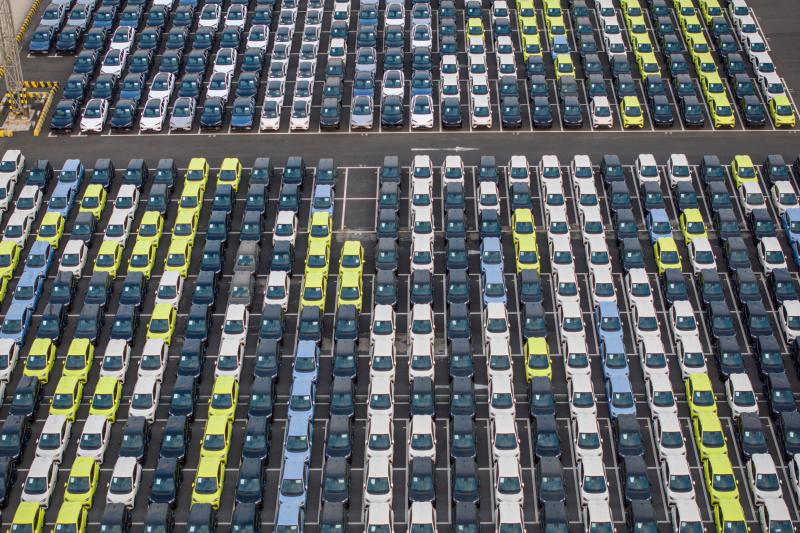China’s Ministry of Commerce is meeting with some of the country’s biggest automakers to discuss whether the industry is using a loophole to mask weakening sales.
The meeting, which was set to take place yesterday afternoon, also included industry bodies such as the China Automobile Dealers Association and online car distribution channels, according to a memo shared by Li Yanwei (李顏偉), an official at the dealers’ association, on Weibo.
A representative for Dongfeng Motor Group Co (東風汽車) said officials from the company attended the gathering. Invitations were extended to carmakers on Sunday and the event wasn’t an inquiry.

Photo: AFP
‘Zero-mileage’ cars came to public attention last week, when Great Wall Motor Co (長城汽車) chairman Wei Jianjun (魏建軍) warned of an unhealthy outlook for China’s car industry following a years-long price war.
The practice sees automakers that have failed to meet their sales targets distribute new vehicles to supply chain financing companies or used car dealers, according to Li. These essentially new cars then appear on the resale market with no mileage and manufacturers record them as sales despite not reaching the end-consumer, he wrote on Weibo.
While that would be viewed as fraud in places like the US, it’s not clearly regulated in China, he said. He urged the Chinese Ministry of Commerce and China Securities Regulatory Commission to stamp out the practice.
It’s unclear which companies are involved, but Wei estimated that as many as 4,000 second-hand sellers post ‘zero-mileage’ cars on online platforms.
He pointed to the practice as indicative of the chaos engulfing China’s auto sector, and warned the industry is facing its own China Evergrande Group (恆大集團) — the defaulted builder that’s an emblem of the country’s years-long property crisis. He declined to identify the company he alluded to.
China’s auto sector has been embroiled in an extended price war that’s taking a major toll on carmakers.
BYD Co (比亞迪) saw shares slump about 10 percent in the first two days of this week after announcing price reductions of as much as 34 percent on Chinese models until the end of next month. The market leader last month posted its slowest year-on-year growth in vehicle deliveries in more than four years.

SEEKING CLARITY: Washington should not adopt measures that create uncertainties for ‘existing semiconductor investments,’ TSMC said referring to its US$165 billion in the US Taiwan Semiconductor Manufacturing Co (TSMC, 台積電) told the US that any future tariffs on Taiwanese semiconductors could reduce demand for chips and derail its pledge to increase its investment in Arizona. “New import restrictions could jeopardize current US leadership in the competitive technology industry and create uncertainties for many committed semiconductor capital projects in the US, including TSMC Arizona’s significant investment plan in Phoenix,” the chipmaker wrote in a letter to the US Department of Commerce. TSMC issued the warning in response to a solicitation for comments by the department on a possible tariff on semiconductor imports by US President Donald Trump’s

The government has launched a three-pronged strategy to attract local and international talent, aiming to position Taiwan as a new global hub following Nvidia Corp’s announcement that it has chosen Taipei as the site of its Taiwan headquarters. Nvidia cofounder and CEO Jensen Huang (黃仁勳) on Monday last week announced during his keynote speech at the Computex trade show in Taipei that the Nvidia Constellation, the company’s planned Taiwan headquarters, would be located in the Beitou-Shilin Technology Park (北投士林科技園區) in Taipei. Huang’s decision to establish a base in Taiwan is “primarily due to Taiwan’s talent pool and its strength in the semiconductor

An earnings report from semiconductor giant and artificial intelligence (AI) bellwether Nvidia Corp takes center stage for Wall Street this week, as stocks hit a speed bump of worries over US federal deficits driving up Treasury yields. US equities pulled back last week after a torrid rally, as investors turned their attention to tax and spending legislation poised to swell the US government’s US$36 trillion in debt. Long-dated US Treasury yields rose amid the fiscal worries, with the 30-year yield topping 5 percent and hitting its highest level since late 2023. Stocks were dealt another blow on Friday when US President Donald

UNCERTAINTY: Investors remain worried that trade negotiations with Washington could go poorly, given Trump’s inconsistency on tariffs in his second term, experts said The consumer confidence index this month fell for a ninth consecutive month to its lowest level in 13 months, as global trade uncertainties and tariff risks cloud Taiwan’s economic outlook, a survey released yesterday by National Central University found. The biggest decline came from the timing for stock investments, which plunged 11.82 points to 26.82, underscoring bleak investor confidence, it said. “Although the TAIEX reclaimed the 21,000-point mark after the US and China agreed to bury the hatchet for 90 days, investors remain worried that the situation would turn sour later,” said Dachrahn Wu (吳大任), director of the university’s Research Center for